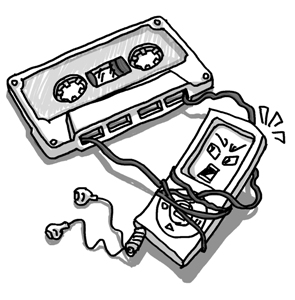 China's new-type guided missile frigate 'Bengbu' in live fire training
China's new-type guided missile frigate 'Bengbu' in live fire training
 China’s weekly story (2013.8.10 - 8.23)
China’s weekly story (2013.8.10 - 8.23)
 Flight team performs first show abroad
Flight team performs first show abroad
 With parents bedridden, 12-year-old boy becomes pillar of the family
With parents bedridden, 12-year-old boy becomes pillar of the family
 Top 10 private Chinese enterprises 2013
Top 10 private Chinese enterprises 2013
 The most gorgeous Chinese women in the eyes of foreigners
The most gorgeous Chinese women in the eyes of foreigners
 |
| Illustration: Lu Ting/GT |
For most young parents, tape cassette players, like the iconic Sony Walkman, were a popular, cutting-edge technology when they were students. However, parents today now find themselves struggling to search local department stores for these "antique" devices for their own children, who have to listen to tape recordings for their school work.
In spite of the fact that digital audio has been widely used for more than a decade, many local parents are astonished to find tape cassettes attached to their children's textbooks for subjects ranging from Chinese and English, to mathematics and music.
Ni Minjing, director of fundamental education at the Shanghai Municipal Education Commission, said he proposed replacing the tape cassettes for textbooks with digital audio seven years ago. But his proposal was never adopted because publishers raised concerns that the digital content would be pirated, copied and spread, violating their copyright and affecting their profits.
However, digital publication is a trend that shows no signs of stopping.
The protection of copyright and maintenance of profit can be realized through technical means and relevant laws, but we cannot sacrifice the convenience and cheapness of digital audio to return to the era of audio tapes.
Audio files can be protected from pirating through file encryption technologies. The problem is whether the publishing houses are willing to spend extra money in cooperating with technical institutions to work out the solutions.
Copyright protection laws can be also strengthened and updated to prevent piracy. Of course, law enforcement departments must work harder to protect publishers' rights and interests.
Reform of the industry can encourage companies to be more innovative and productive.
Publishers need not worry that they cannot profit from the sales of tape cassettes. They can charge for downloads of audio files from their websites, and prevent the copying of content through encryption technologies.
Rather than the tape cassettes themselves, the content stored on the cassettes is the most important factor determining a publisher's survival. Publishing houses shouldn't just rest on their laurels without exploration and innovation of new content. This is also the reason Jeff Bezos, founder and CEO of Amazon, developers of the Kindle e-book reader, purchased the Washington Post early last month. Although Bezos helped to pioneer a new medium for content delivery, he thinks the content itself is equally important.
Meanwhile, digital audio is a cost-effective solution for everybody. Families that don't have tape players have to spend extra money to buy one for their children, which may cost several hundred yuan. Even more troublesome for parents is that the tape cassettes are often left untouched when the semester is over.
The price of one tape cassette is roughly 6 yuan ($0.98) to 7 yuan. The cost of producing a tape cassette is more expensive than the cost of digitizing the audio and uploading it to the Internet. The continued expenditure on the tapes is merely prolonging the inevitable death of the cassette manufacturing industry.
Moreover, it is good for young children to have access to advanced technologies as early as possible. As we know, many information technology geeks who grew into industry pioneers became interested in cutting-edge products when they were very young.
It is a relief to hear that Ni Minjing told the Shanghai Evening Post that the local education authority is working on a website to host all the digital audio study materials of local primary and high schools. Every student will be allowed to download the materials with their unique student number for free.
Of course, there are still some local families who are not able to afford computers, Internet access or MP3 players. For students from these families, publishers should also prepare some tape cassettes if they are needed. And schools and teachers should also take the responsibility to help these students have access to the digital study materials.
 Mexican president delivers first State of Nation address
Mexican president delivers first State of Nation address Highlights of MAKS 2013 Int'l Aviation and Space Show
Highlights of MAKS 2013 Int'l Aviation and Space Show  10th China-ASEAN Expo opens in Nanning
10th China-ASEAN Expo opens in Nanning Baby born to save his sister - the story of a savior sibling
Baby born to save his sister - the story of a savior sibling Lady of mystery: Female SWAT team in prison disclosed
Lady of mystery: Female SWAT team in prison disclosed  Single mother, baby live in KFC restaurant for months
Single mother, baby live in KFC restaurant for months Top 10 naked hotels in the world
Top 10 naked hotels in the world The most gorgeous Chinese women in the eyes of foreigners
The most gorgeous Chinese women in the eyes of foreigners A collection of bizarre rooftop buildings around China
A collection of bizarre rooftop buildings around China Putin intimate contacts with marine animals
Putin intimate contacts with marine animals China's frigate 'Bengbu'in fire training
China's frigate 'Bengbu'in fire training Fresh students 'forced' to register in university independently
Fresh students 'forced' to register in university independently 2013 Taiwan Int'l Tourism Expo kicks off in Taipei
2013 Taiwan Int'l Tourism Expo kicks off in Taipei Photo story: Take a gap year
Photo story: Take a gap year Nokia's Global Headquarters: visiting a declining empire
Nokia's Global Headquarters: visiting a declining empireDay|Week|Month